As an Amazon Associate I earn from qualifying purchases.
As you explore the resurgence of Hellenism, you'll find that modern practitioners are reconnecting with Greek deities by adapting ancient rituals to fit contemporary values. This movement isn't just about historical reenactment; it's a meaningful expression of identity and community. Yet, how do these revived practices address today's spiritual and environmental concerns? Understanding this dynamic intersection of past and present will reveal the evolving role of Hellenism in our modern world.
Key Takeaways
- Modern Hellenism revives ancient rituals by adapting them to contemporary contexts, emphasizing personal growth and environmental awareness.
- Greek mythology is central to Hellenism today, providing cultural cohesion and spiritual symbolism through the stories of deities like Athena and Apollo.
- Digital gatherings and online communities facilitate the practice of Hellenic rituals, ensuring accessibility and fostering a sense of belonging among practitioners.
- Hellenism promotes ecological consciousness through rituals that celebrate nature as sacred, aligning ancient practices with modern sustainability efforts.
- Community festivals and shared rituals strengthen cultural engagement, allowing practitioners to reflect on the relevance of ancient Greek beliefs in modern life.
The Origins of Hellenism: A Historical Overview
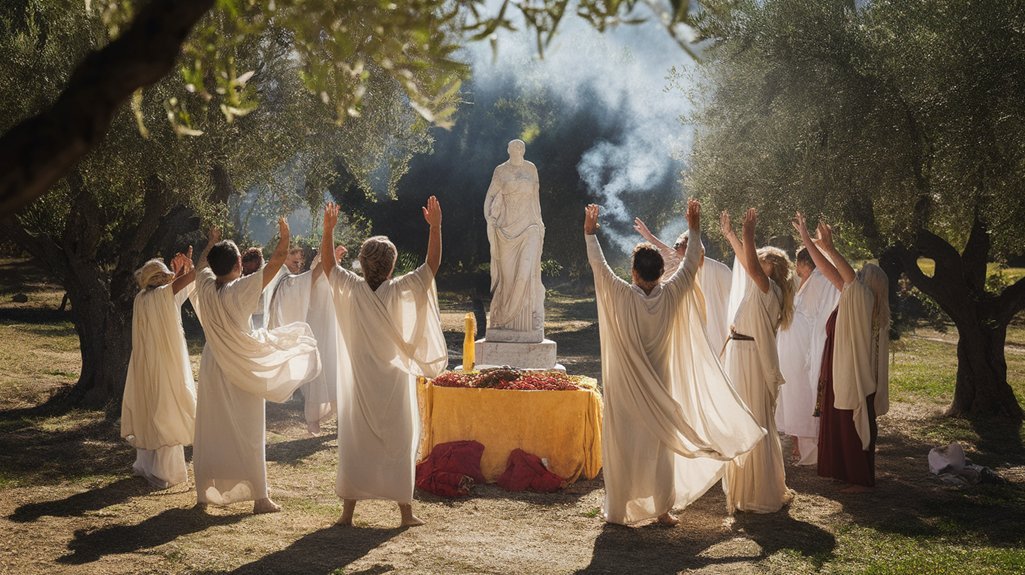
Hellenism, a cultural and intellectual movement, traces its roots back to the conquests of Alexander the Great in the 4th century BCE. As you explore its origins, consider how these conquests facilitated the blending of Greek culture with local traditions across a vast empire. This exchange of ideas and practices led to a cultural revival that drew heavily on ancient influences. You'll find that Greek language, art, and philosophy became pervasive, shaping societies from Egypt to India.
This widespread dissemination of Greek culture wasn't just about adopting new customs; it was a complex dialogue between the old and the new. As you delve deeper, notice how Hellenism resurrected classical Greek thought while incorporating elements from other civilizations. This synthesis provided a rich tapestry that influenced subsequent cultural and intellectual developments in the Mediterranean and beyond. Understanding these origins offers valuable insights into modern interpretations of Hellenic traditions.
Key Deities in Hellenic Worship: From Zeus to Athena
Central to Hellenic worship were the deities, each embodying distinct aspects of the natural and human world. You find Zeus at the apex of this divine hierarchy. Known as the king of gods, Zeus mythology illustrates his dominion over the sky and justice. In contrast, Athena, goddess of wisdom and warfare, represents strategic thought and reason. Her worship emphasizes the pursuit of knowledge and courage in battle.
| Deity | Attributes |
|---|---|
| Zeus | Sky, Thunder, Justice |
| Athena | Wisdom, Warfare, Strategy |
| Poseidon | Sea, Earthquakes |
| Hera | Marriage, Family, Women |
| Apollo | Music, Prophecy, Healing |
Understanding these deities offers insights into ancient Greek values. Zeus's rule highlights authority and order, while Athena worship underscores intellect and bravery. This pantheon reflects both the Greeks' reverence for natural forces and their appreciation for human virtues. Through these gods, you grasp essential facets of Greek culture and spirituality.
Ancient Rituals Revived: The Practice of Modern Hellenism
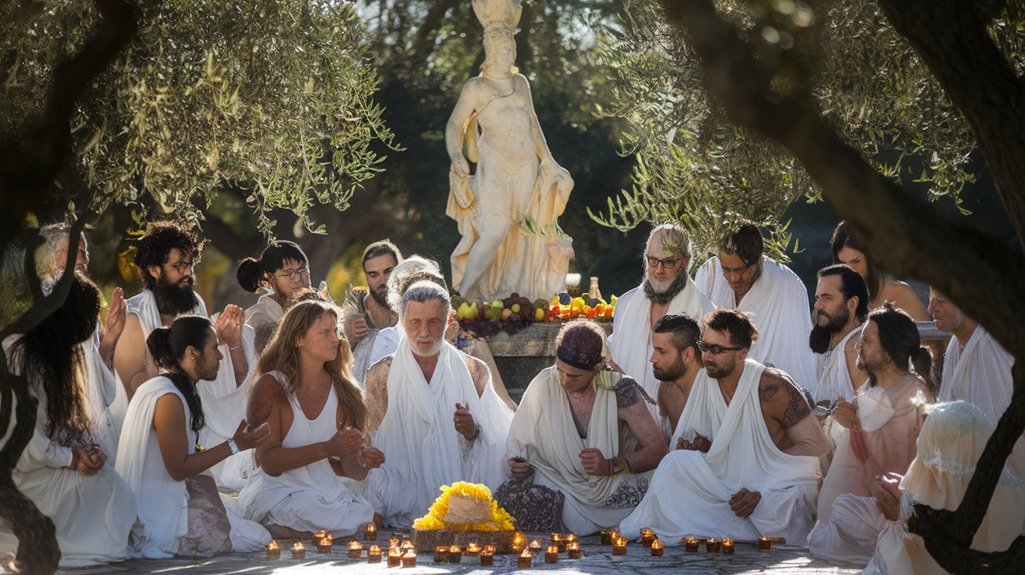
In modern Hellenism, you see a fascinating blend as practitioners reinterpret traditional ceremonies to fit contemporary contexts, ensuring these ancient rituals resonate with today's world. By integrating modern practices, like digital gatherings and environmental consciousness, the community maintains a dynamic connection to their cultural heritage. This revitalization fosters a sense of belonging and cultural continuity, bridging the past and present.
Reinterpretation of Traditional Ceremonies
Although the ancient traditions of Hellenism have long been viewed through a historical lens, modern practitioners are breathing new life into these age-old rituals. You see this in how traditional ceremonies are reinterpreted to align with contemporary values while maintaining their core ritual symbolism. Seasonal ceremonies, once tied closely to agricultural cycles, are now celebrated in ways that emphasize personal growth and environmental awareness. By doing so, you honor the gods and create a connection to the past, while addressing modern concerns. This reinterpretation ensures that the rituals remain relevant in today's world. It allows you to engage with the traditions in a meaningful way, fostering a deeper understanding of Hellenic culture and its enduring influence on modern spirituality.
Integration of Modern Practices
Modern Hellenism thrives as it integrates contemporary practices into ancient rituals, creating a dynamic fusion that resonates with today's spiritual seekers. By embracing a modern interpretation, you can bridge the gap between traditional beliefs and current cultural contexts. This approach allows for a personalized experience that acknowledges historical roots while adapting to contemporary life.
Cultural adaptation is key in this process. You might incorporate technology, like using digital platforms for gatherings or apps for tracking lunar cycles, into your practices. This integration ensures rituals remain relevant and accessible, fostering a deeper connection to the divine. By blending the old with the new, Hellenism today becomes a living tradition, evolving to meet the spiritual needs of modern society while honoring its rich heritage.
Community and Cultural Connection
As you explore the practice of modern Hellenism, community and cultural connection emerge as vital components in reviving ancient rituals. By participating in spiritual gatherings, you foster shared experiences that strengthen community bonding. These ritual practices create a collective identity, promoting cultural exchange and intergenerational connections. Local initiatives play a crucial role in heritage preservation, ensuring traditions don't fade.
- Shared experiences: Engage with others in meaningful ways.
- Collective identity: Build a sense of belonging through rituals.
- Cultural exchange: Learn from diverse perspectives and traditions.
- Community bonding: Strengthen ties through common practices.
- Social activism: Use Hellenic principles to address contemporary issues.
Through these efforts, modern Hellenism becomes more than a tradition; it evolves into a living culture, enriched by active participation.
The Role of Mythology in Contemporary Hellenism
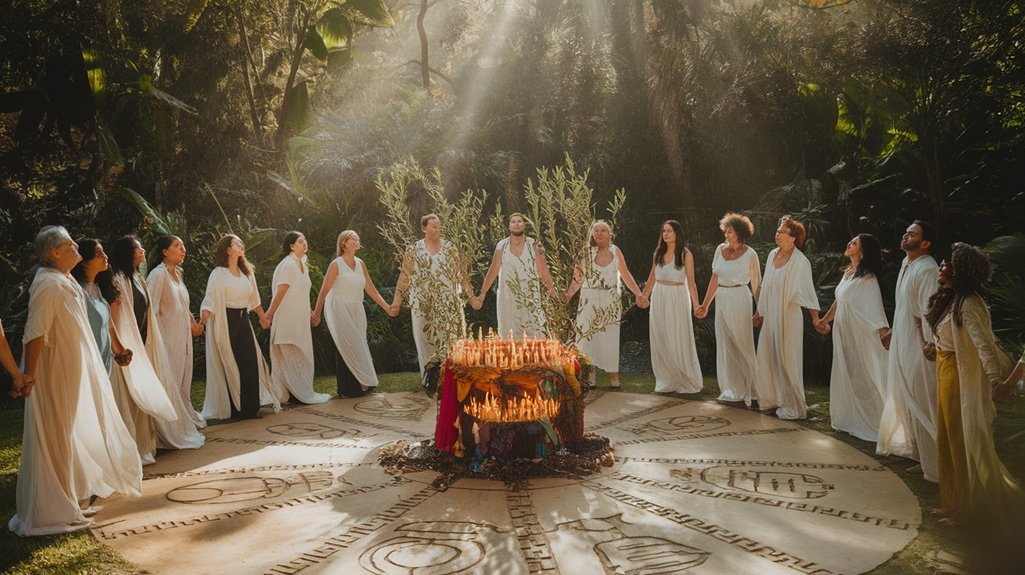
While mythology might seem like an ancient relic, it plays a vital role in contemporary Hellenism by providing cultural cohesion and a sense of identity. Mythic relevance in today's world is found in the stories that continue to resonate with human experiences. These narratives offer insights into divine symbolism, helping you connect with the Greek pantheon on a deeper level. The myths are not just stories; they are metaphors for understanding both the divine and human condition.
Consider this:
| Myth | Symbolism | Emotion |
|---|---|---|
| Persephone | Rebirth | Hope |
| Athena | Wisdom | Inspiration |
| Hades | Underworld | Introspection |
These tales encourage reflection, fostering a communal bond among those who seek to revive Hellenistic practices. By engaging with mythological stories, you're not only participating in a cultural revival but also finding personal meaning. This active engagement strengthens your connection to a shared heritage, making mythology indispensable in modern Hellenic practice.
The Influence of Hellenism on Modern Spirituality
You're likely noticing how Hellenism is experiencing a resurgence, as many individuals incorporate ancient practices into their modern spiritual routines. This revival often merges seamlessly with contemporary beliefs, creating a unique synthesis that respects historical traditions while adapting to today's spiritual needs. By examining these integrations, you can better understand the enduring impact of Hellenistic thought on current spiritual landscapes.
Revival of Ancient Practices
Though often overlooked, the revival of ancient Hellenistic practices is leaving a significant mark on modern spirituality. As you explore these practices, you'll notice their ritual significance and cultural authenticity. By engaging with these ancient rituals, you connect with traditions that have existed for centuries, offering a sense of continuity and depth to your spiritual journey. Understanding the influence of Hellenism on modern spirituality involves recognizing how these practices resonate with contemporary seekers.
- Ritual Significance: Each ritual holds profound meaning and a connection to Greek deities.
- Cultural Authenticity: Practices are rooted in historically accurate traditions.
- Spiritual Connection: Engage with a spiritual lineage that transcends centuries.
- Community Building: Shared rituals foster a sense of belonging.
- Personal Growth: Deepen your understanding of self and the divine.
Integration With Contemporary Beliefs
In today's diverse spiritual landscape, the integration of Hellenistic beliefs with contemporary practices illustrates a fascinating synergy between ancient traditions and modern spirituality. You'll find Hellenic ethics interweaving with personal devotion, enriching spiritual pluralism. The embrace of Divine feminism and Nature worship highlights cultural syncretism, offering fresh perspectives on gender and ecology. Mythic storytelling and ritual symbolism enhance spiritual experiences, fostering a deeper connection to the divine. By blending these elements, individuals craft unique paths that honor both tradition and personal belief.
| Hellenic Ethics | Divine Feminism | Nature Worship |
|---|---|---|
| Personal Devotion | Cultural Syncretism | Spiritual Pluralism |
| Ritual Symbolism | Mythic Storytelling | Ancient Traditions |
This integration not only revives ancient practices but also adapts them to resonate with today's spiritual seekers.
Celebrating Hellenic Festivals: Bridging Past and Present
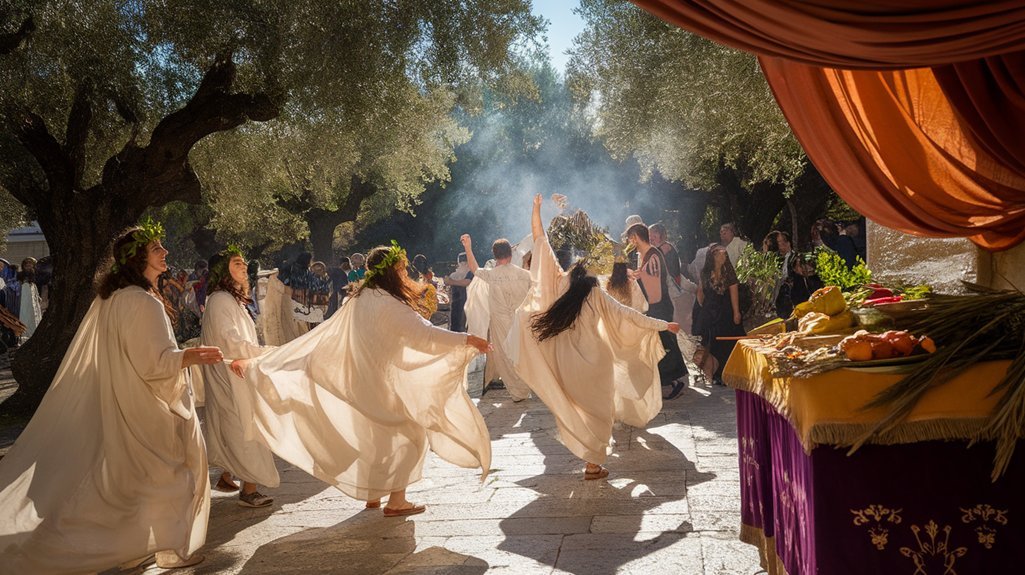
Despite the passage of centuries, Hellenic festivals continue to serve as a vibrant testament to the enduring legacy of ancient Greek culture. By participating in these events, you can directly engage with the cultural symbolism and artistic expressions that define Hellenic art. These festivals are not just historical reenactments but living celebrations that allow for a deep connection with the past.
Through these gatherings, you can explore:
- Hellenic art: Experience timeless beauty through traditional crafts and performances.
- Cultural symbolism: Understand the deeper meanings behind rituals and customs.
- Community engagement: Build connections with others who share an interest in Greek culture.
- Preservation of traditions: Help ensure ancient practices continue to thrive today.
- Personal reflection: Gain insights into how ancient beliefs resonate in the modern world.
The Intersection of Hellenism and Modern Culture
In today's world, you're likely to encounter Greek deities not only in ancient texts but also through their widespread presence in modern media, where they're often reimagined to resonate with contemporary audiences. This cultural interplay extends to ancient rituals, which are frequently adapted to fit modern practices, highlighting an ongoing fascination with Hellenic traditions. By examining these adaptations, you can gain insight into how ancient Greek culture continues to influence and shape modern cultural landscapes.
Greek Deities in Media
Although ancient in origin, Greek deities have seamlessly woven themselves into the fabric of modern media, creating a fascinating intersection of Hellenism and contemporary culture. You'll notice that these deities continue to captivate audiences through various media representations. Their character archetypes and symbolic references are evident in films, literature, and other artistic expressions. This cultural adaptation allows Greek deities to remain relevant, offering modern interpretations that resonate with today's audiences. Their narrative influence is profound, shaping stories and themes that explore universal human experiences.
Consider these ways Greek deities manifest in media:
- Movies and TV shows often feature reimagined gods and heroes.
- Literature explores timeless tales with fresh perspectives.
- Video games use mythological themes and characters.
- Art installations highlight divine symbolism.
- Comics reinterpret classic myths for new generations.
Ancient Rituals Reimagined
While modern society races forward, it also finds value in looking back to the rituals of ancient Greece, reimagining them for today's cultural landscape. You'll notice how these rituals, steeped in profound ritual symbolism, are adapted to resonate with contemporary values and settings. The sacred spaces once dedicated to Greek deities are now interpreted in various forms, from nature retreats to urban sanctuaries, allowing individuals to connect with spirituality in diverse environments. By integrating traditional elements with modern practices, these rituals transcend time, offering a bridge between past and present. This approach fosters a deeper understanding of Hellenism's enduring influence, demonstrating how ancient practices can be relevant and meaningful within today's cultural and spiritual frameworks.
Personal Journeys: How Individuals Connect With Hellenism
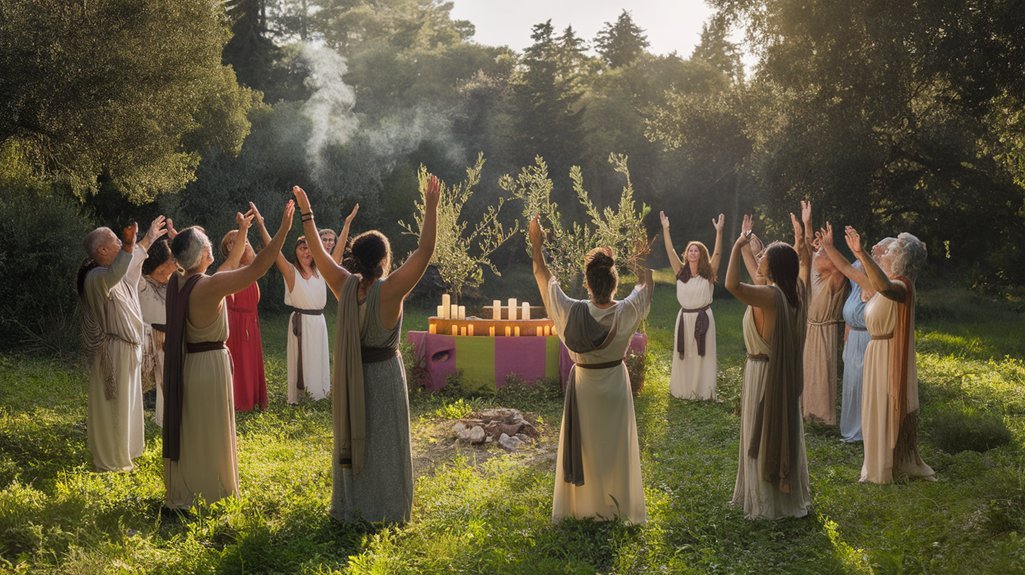
What compels individuals today to seek a connection with Hellenism? Many are drawn to Hellenism for its rich tapestry of mythology and its potential to offer profound personal experiences. You might embark on a spiritual journey to explore and reconnect with the ancient Greek deities, finding resonance in their stories and teachings. This path often involves integrating historical rituals into your daily life, creating a personal link to the divine.
Your personal experiences may vary widely, yet there are common themes in how people connect with Hellenism:
- Curiosity about ancient cultures can spark an interest in exploring Greek traditions.
- Desire for spiritual fulfillment often leads to the embrace of Hellenistic practices.
- Seeking a deeper sense of identity through historical narratives and deities.
- Appreciation for mythology's moral lessons that remain relevant today.
- Pursuit of personal growth through meditation and reflection on ancient wisdom.
Each journey is unique, yet intertwined with shared motivations.
Community and Tradition: Building Modern Hellenic Networks
As individuals discover personal connections to Hellenism, many naturally seek the camaraderie and support found in modern Hellenic networks. These communities provide a space where shared traditions foster deeper connections. You'll notice that community gatherings play a crucial role in maintaining and nurturing these bonds. By participating in events, you experience a sense of belonging that transcends geographical boundaries.
Traditional music often accompanies these gatherings, acting as a bridge between the past and present. Its rhythms and melodies create an immersive environment where cultural heritage is both celebrated and preserved. Listening to or participating in traditional music can enhance your appreciation of Hellenic traditions, allowing you to engage with them on a more profound level.
Ultimately, these networks not only strengthen individual connections to Hellenism but also build a resilient, supportive community that thrives on shared cultural experiences and mutual understanding.
Challenges and Misconceptions About Modern Hellenism
Despite the vibrant revival and appreciation of Hellenism today, several challenges and misconceptions persist that can hinder its full understanding and appreciation. Cultural appropriation is often a concern, as individuals may misunderstand or misrepresent rituals, impacting their spiritual authenticity. Ensuring historical accuracy can be difficult, especially when reconstructing ancient practices for modern identity. Community misconceptions arise when outsiders or even practitioners misunderstand the ritual significance or personal beliefs within Hellenism.
To navigate these challenges, consider:
- Educational outreach is essential for clarifying misconceptions about Hellenic practices.
- Embracing diversity within the community helps balance modern identity with ancient traditions.
- Preserving historical accuracy requires diligent research and respect for original sources.
- Addressing cultural appropriation involves fostering awareness and sensitivity to genuine practices.
- Promoting spiritual authenticity focuses on meaningful engagement with deities and rituals.
Understanding these issues enriches the journey toward authentic Hellenic appreciation.
Hellenism and Environmental Consciousness
In examining the intersection of Hellenism and environmental consciousness, it's clear that ancient Greek philosophy and religion offer valuable perspectives on nature and our role within it. The Greeks viewed the world through a lens of sacred ecology, where gods and nature were deeply intertwined. By recognizing divine stewardship, you acknowledge the responsibility to care for the Earth as the Greeks did, seeing the environment as a living entity deserving of respect and protection.
Here's a concise breakdown of key concepts:
| Concept | Description |
|---|---|
| Sacred Ecology | The belief that nature is inherently sacred and divine. |
| Divine Stewardship | The duty to protect and sustain the natural world. |
| Ancient Practices | Rituals and philosophies promoting environmental care. |
Understanding these elements encourages a holistic view of environmental responsibility. By embracing these ancient ideals, you can foster a deeper connection with the natural world, aligning modern ecological efforts with timeless wisdom.
Future Prospects: The Evolving Landscape of Hellenism
Building on the insights from ancient Greek perspectives on nature, the evolving landscape of Hellenism offers a rich tapestry for future exploration and growth. This evolution is marked by an intriguing blend of tradition and modernity, where digital communities play a pivotal role. By leveraging online platforms, you can engage with like-minded individuals and participate in future rituals that honor Greek deities. These communities create spaces where ancient practices meet contemporary needs, promoting a deeper connection to Hellenic beliefs.
Consider these elements shaping Hellenism's future:
- Integration of technology: Use digital tools to access resources and organize virtual gatherings.
- Cross-cultural exchanges: Engage with global perspectives to enrich traditional rituals.
- Personalized practices: Tailor rituals to reflect individual beliefs and modern contexts.
- Environmental stewardship: Embrace rituals that align with ecological consciousness.
- Educational initiatives: Foster understanding through accessible information and discussions.
This dynamic interplay ensures Hellenism remains vibrant and relevant.
Frequently Asked Questions
Are There Specific Dietary Practices Associated With Modern Hellenism?
In modern Hellenism, you'll find dietary practices often include sacred foods linked to ritual offerings. These practices vary, emphasizing traditional ingredients like honey, wine, and grains, aligning with historical rituals to honor Greek deities and cultivate spiritual connections.
How Do Hellenic Practitioners Incorporate Technology Into Their Rituals?
You incorporate technology into your rituals by hosting virtual rituals and making digital offerings. These practices allow you to connect with fellow practitioners globally, ensuring the continuity and adaptation of ancient traditions in a modern, interconnected world.
What Role Does Music Play in Contemporary Hellenic Worship?
In contemporary Hellenic worship, you'll find music playing a vital role. Sacred melodies and ritual chants create an immersive atmosphere, enhancing spiritual focus. They're essential for connecting emotionally and mentally with the divine, strengthening communal bonds.
Are There Specific Dress Codes for Participating in Hellenic Ceremonies?
You might find specific dress codes in Hellenic ceremonies, where ceremonial attire often holds ritual symbolism. Wearing traditional garments can enhance connection and respect for the deities. However, guidelines vary, and flexibility is sometimes practiced to accommodate participants.
How Is Art Used to Express Hellenic Beliefs Today?
Artistic expression today juxtaposes ancient tradition with modern symbolism, capturing Hellenic beliefs through vivid imagery and sculpture. You see artists infusing contemporary styles with classical themes, bridging the past and present to deepen cultural understanding and spiritual connection.
Conclusion
As you explore the vibrant world of modern Hellenism, consider how ancient rituals and mythology can enrich your spiritual journey. Isn't it fascinating how these age-old traditions find new life in today's environmental consciousness and personal growth pursuits? By engaging with these practices, you're not only preserving cultural heritage but also fostering a sense of community and belonging. Will the evolving landscape of Hellenism continue to inspire future generations to reconnect with timeless wisdom and values?
Amazon and the Amazon logo are trademarks of Amazon.com, Inc, or its affiliates.


